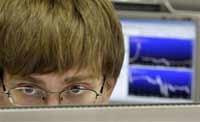Russia to turn world financial crisis to its own advantage
The speaker of the Russian Federation Council, Sergei Mironov, excludes an opportunity for the 1998 financial collapse to repeat in present-day Russia. “There will be no default. I am certain that the 1998 situation will not repeat here,” Itar-Tass quoted Mironov as saying.

The speaker said that Russia had saved a considerable amount of financial assets, including those in gold and currency reserves, and could therefore meet its obligations.
At the same time, the official said that there were no grounds for optimism in the estimation of the current financial situation.
“This is a serious crisis, and there is every reason to believe that it will be a rather long-lasting one,” Mironov said. The construction and mortgage lending industries suffer most from the negative consequences in the global economy, the official believes.
“However, there are opportunities for an economic breakthrough in the Russian Federation,” Mironov believes. The use of the National Wealth Fund and gold and currency reserves could be a recipe for success, he said.
“This would be a reasonable measure. One should not be concerned with the fact that the state uses the funds of its strategic reserves to prevent the financial crisis. We begin to credit our own economy,” Sergei Mironov said.
The speaker is certain that the Russian economy will be able to turn the world financial crisis to its own advantage. “Russia has all opportunities to use the crisis for changing the structure of its economy, as it happened after 1998,” he said.
In the meantime, Russia's stock markets joined Asian and U.S. markets in an upward surge Tuesday, prompting regulators to suspend trading on one of the two major exchanges, the AP reports.
The MICEX, where most of Russia's trading takes place, climbed 11.2 percent before financial regulators ordered trading halted for an hour. The RTS climbed 6.4 percent by 11:15 a.m. (0715 GMT).
Also Tuesday, the Federal Financial Markets Service expanded the threshold for shutting down trading - from 5 percent to 10 percent.
The rise followed Monday's sharp decline on lower world oil prices and new struggles for control of the world's largest nickel miner. Regulators suspended trading several times on the two exchanges.
The global financial crisis, Russia's five-day war in August with Georgia and plummeting commodity prices have made Russian markets some of the world's worst-performing.
The RTS is down more than 65 percent from its May high. The MICEX has lost over 64 percent.
Subscribe to Pravda.Ru Telegram channel, Facebook, RSS!


